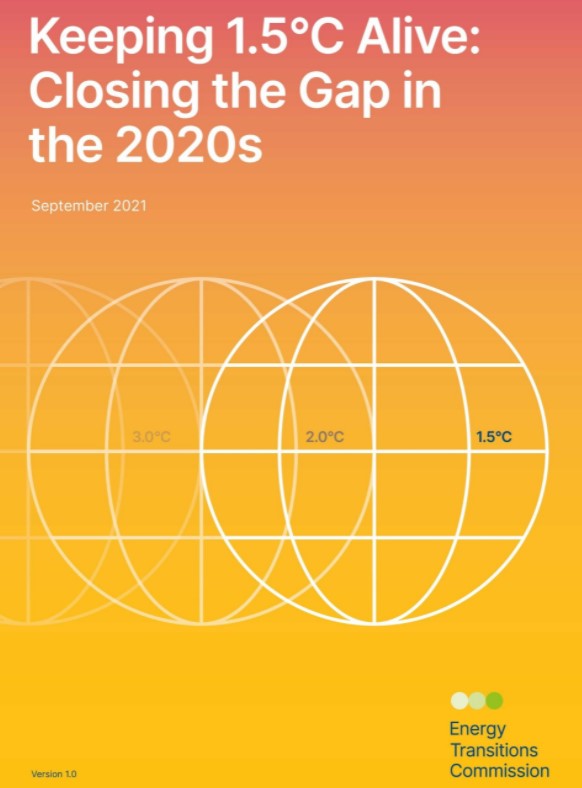Keeping 1.5°C Alive: Closing the Gap in the 2020s

|
Contents |
[edit] Introduction
On 30 September 2021, the Energy Transitions Commission (ETC) set out the actions which nations and companies could take during the 2020s to deliver the Paris agreement and limit global warming to 1.5°C. The ETC is a global coalition of leaders from across the energy landscape committed to achieving net zero emissions by the middle of the century.
[edit] Six action items
Keeping 1.5°C Alive: Closing the Gap in the 2020s describes technologically feasible actions which could close the gap created by national decarbonisation pledges (known as Nationally Determined Contributions, or NDCs) that fall short of those needed to prevent global warming from exceeding 1.5°C above pre-industrial levels. An additional 17-20 Gt of CO2 reductions and a 40% reduction in methane emissions would be needed to achieve that objective.
The six categories of action identified by the ETC are:
- Significant and rapid reductions in methane emissions.
- Halting deforestation and beginning reforestation.
- Decarbonising the power sector and accelerating the phaseout of coal.
- Accelerating the electrification of road transport.
- Accelerating supply decarbonisation in buildings, heavy industry, and heavy transport.
- Reinvigorating energy and resource efficiency.
The actions in the report might be achievable with minimal cost, and their adoption could spur further innovation and support green economic development. All six of the actions could be given impetus at COP26 via commitments from leading countries and companies without the need for comprehensive international agreement. However, two high priority actions – ending deforestation and reducing emissions from existing coal plants – will require support from climate finance flows from rich developed countries.
[edit] Related articles
- Climate Change Act.
- Decarbonise.
- Economic development and construction.
- Forests.
- Methane.
- Nationally Determined Contribution.
[edit] External resources
Featured articles and news
UKCW London to tackle sector’s most pressing issues
AI and skills development, ecology and the environment, policy and planning and more.
Managing building safety risks
Across an existing residential portfolio; a client's perspective.
ECA support for Gate Safe’s Safe School Gates Campaign.
Core construction skills explained
Preparing for a career in construction.
Retrofitting for resilience with the Leicester Resilience Hub
Community-serving facilities, enhanced as support and essential services for climate-related disruptions.
Some of the articles relating to water, here to browse. Any missing?
Recognisable Gothic characters, designed to dramatically spout water away from buildings.
A case study and a warning to would-be developers
Creating four dwellings... after half a century of doing this job, why, oh why, is it so difficult?
Reform of the fire engineering profession
Fire Engineers Advisory Panel: Authoritative Statement, reactions and next steps.
Restoration and renewal of the Palace of Westminster
A complex project of cultural significance from full decant to EMI, opportunities and a potential a way forward.
Apprenticeships and the responsibility we share
Perspectives from the CIOB President as National Apprentice Week comes to a close.
The first line of defence against rain, wind and snow.
Building Safety recap January, 2026
What we missed at the end of last year, and at the start of this...
National Apprenticeship Week 2026, 9-15 Feb
Shining a light on the positive impacts for businesses, their apprentices and the wider economy alike.
Applications and benefits of acoustic flooring
From commercial to retail.
From solid to sprung and ribbed to raised.
Strengthening industry collaboration in Hong Kong
Hong Kong Institute of Construction and The Chartered Institute of Building sign Memorandum of Understanding.
A detailed description from the experts at Cornish Lime.























